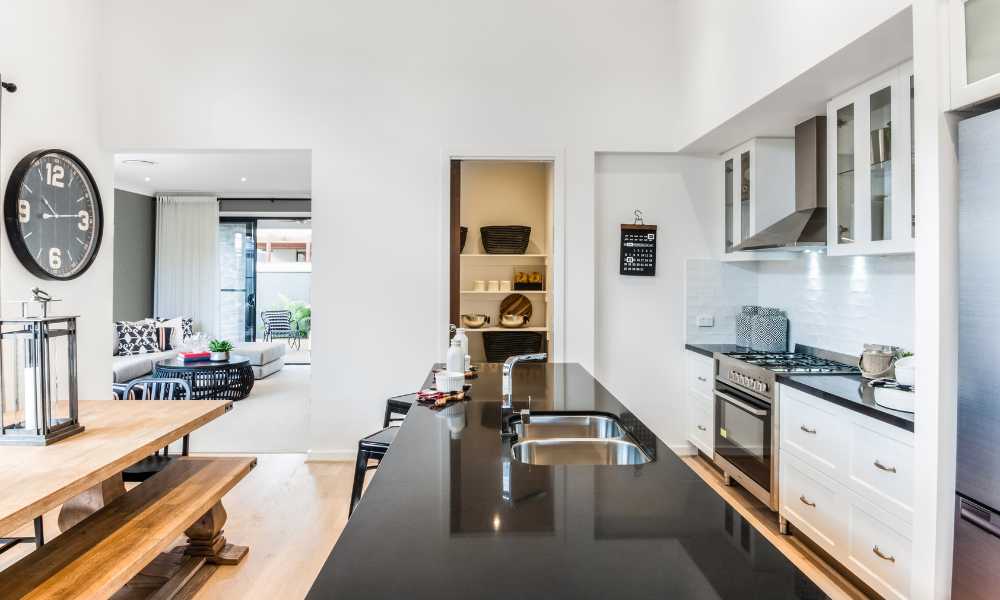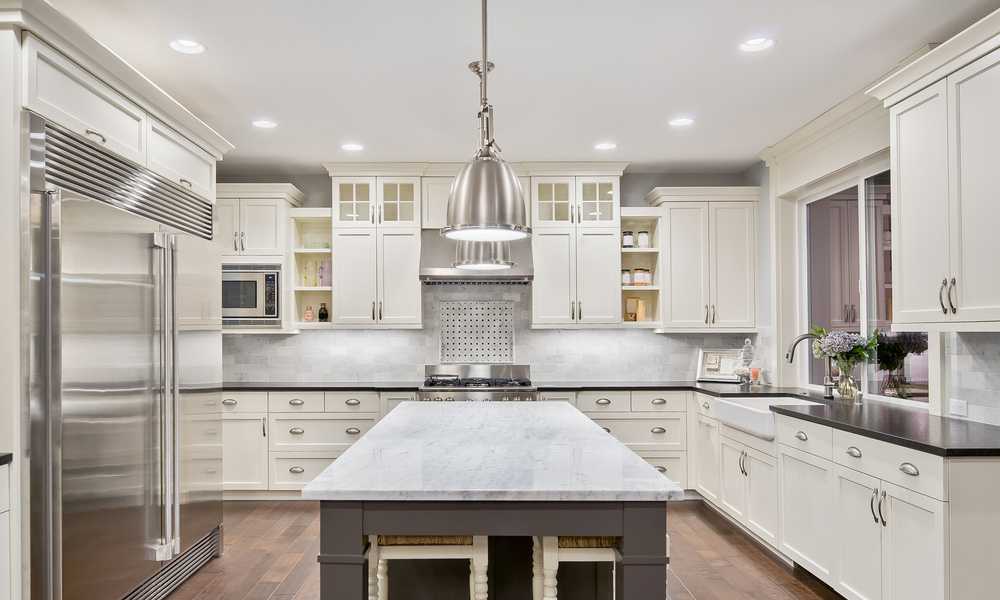The duration of a kitchen renovation is influenced by various factors that collectively shape the overall timeline of the project. The significance of the renovation, extending beyond aesthetics to impact functionality and property value, adds a layer of anticipation to the process. Factors such as the scope of the renovation, intricacies of design and planning, contractor availability, unforeseen issues, and the timeline for permits and inspections all contribute to the project’s duration. The complexity of the renovation, ranging from cosmetic updates to structural changes, directly affects planning, execution, and completion times. Thorough design planning is crucial, as rushing through this phase may lead to costly mistakes and delays during construction. Additionally, the availability of skilled contractors and the occurrence of unforeseen problems, such as hidden issues or complications with permits, can either expedite or extend the renovation timeline. Therefore, a comprehensive understanding of these factors is essential for homeowners and professionals alike to manage expectations and ensure a successful kitchen renovation.
Factors Influencing Renovation Time
Kitchen Size and Complexity
Small vs. Large Kitchens
The size of the kitchen is a fundamental factor influencing the duration of a renovation. Small kitchens, with less square footage, generally require less time for demolition, construction, and installation compared to their larger counterparts. The compact nature of small kitchens often simplifies the logistics and coordination of the renovation process. Conversely, larger kitchens may involve more extensive work, from flooring to cabinetry, contributing to a longer overall timeline.
Structural Changes and Complexities
The level of structural changes and complexities involved in a kitchen renovation significantly impacts the time required for completion. Projects that necessitate alterations to the existing layout, such as moving walls, or relocating plumbing or electrical systems, generally take longer to execute. Dealing with structural modifications demands careful planning and execution to ensure both safety and compliance with building codes, contributing to an extended renovation timeline.
Design and Customization
Unique Features and Intricate Details
The extent of design intricacies and unique features incorporated into a kitchen renovation can influence the time it takes to bring the vision to life. Intricate details, such as customized storage solutions, unique backsplash designs, or specialty appliances, may require additional time for planning and execution. The meticulous nature of incorporating these features demands precision and craftsmanship, contributing to an extended project timeline.
Custom-Built Elements
The decision to include custom-built elements in the kitchen design adds a layer of complexity to the renovation process. Custom cabinetry, countertops, and specialized fixtures often involve a longer lead time for fabrication and installation compared to off-the-shelf alternatives. While these custom elements contribute to a personalized and unique kitchen space, their inclusion should be factored into the overall project schedule, impacting the duration of the renovation.
Planning and Preparation Phase
Initial Consultations and Brainstorming
The commencement of a kitchen renovation involves initial consultations with homeowners and professionals, fostering a collaborative approach. During this phase, ideas, preferences, and expectations are discussed, laying the foundation for the project. Brainstorming sessions help crystallize the vision for the renovated kitchen, considering factors such as layout, style, and functionality.
Design Development and Decision-Making
Following initial consultations, the design development phase begins, where detailed plans are crafted based on the agreed-upon vision. This stage involves decisions on layout, materials, color schemes, and specific design elements. Thorough decision-making during this phase is crucial, as it establishes the roadmap for the entire renovation project.
Budgeting and Financial Considerations
Simultaneously, careful budgeting and financial considerations are paramount during the planning phase. Establishing a realistic budget that aligns with the envisioned design and project scope is essential. This involves evaluating material costs, labor expenses, and potential contingencies to ensure a well-managed and financially viable renovation.
Demolition and Disassembly
Clearing Out the Existing Kitchen Space
With the planning and preparation complete, the renovation transitions into the demolition phase. Clearing out the existing kitchen space involves removing furniture, appliances, and fixtures. This process sets the stage for the subsequent construction, allowing for a clean slate to work with.
Disassembling Old Fixtures and Appliances
The careful disassembly of old fixtures and appliances follows the initial clearing process. This step may involve the removal of cabinets, countertops, and other elements slated for replacement. Disassembly requires precision to avoid damage and facilitates the seamless integration of new components in the upcoming construction phase.
Addressing Unforeseen Challenges
Demolition may uncover unforeseen challenges, such as hidden structural issues or outdated electrical and plumbing systems. Addressing these challenges promptly and effectively is crucial for maintaining the project timeline. This phase demands adaptability and problem-solving skills to mitigate unexpected obstacles and ensure a smooth progression to the subsequent stages of the renovation.
Construction and Installation
Structural Work and Remodeling
The construction and installation phase of a kitchen renovation involves executing the planned changes to the space. Structural work, such as wall modifications or the installation of support beams, is addressed during this stage. Remodeling efforts focus on transforming the layout and functionality of the kitchen based on the finalized design.
Installation of New Fixtures, Cabinets, and Appliances
With structural changes in place, the installation of new fixtures, cabinets, and appliances takes center stage. This step requires precision and coordination to ensure that each element aligns with the design and functions seamlessly within the renovated kitchen. Attention to detail during installation contributes to the overall success of the project.
Plumbing and Electrical Updates
Concurrently, updates to plumbing and electrical systems are carried out to accommodate the new layout and fixtures. This may involve rerouting pipes, installing new wiring, or upgrading electrical panels to meet modern safety standards. Ensuring the functionality and compliance of these systems is essential for the long-term success of the renovated kitchen.
Finishing Touches
Painting and Aesthetic Enhancements
As construction nears completion, attention turns to the aesthetic aspects of the renovation. Painting, wallpapering, or other wall treatments are applied to enhance the visual appeal of the space. Aesthetic enhancements, such as backsplashes and decorative elements, contribute to the overall ambiance of the kitchen.
Flooring Installation
The installation of flooring marks another critical step in the finishing touches phase. Whether it’s hardwood, tile, or another flooring material, this stage requires precision and attention to detail to achieve a polished and cohesive look that complements the overall design of the kitchen.
Final Inspections and Quality Checks
Before the project concludes, final inspections and quality checks are conducted to ensure that all aspects of the renovation meet the established standards. This includes verifying the functionality of appliances, confirming the integrity of structural changes, and addressing any outstanding issues to guarantee a successful and durable outcome.
Unforeseen Delays and Challenges
Common Issues During Renovation
Unforeseen challenges, such as the discovery of hidden structural problems, delayed material deliveries, or unexpected weather conditions, can lead to project delays. Common issues may also arise during inspections, requiring adjustments to meet regulatory requirements.
Strategies to Overcome Delays
Strategies to overcome delays include proactive communication with contractors and suppliers, realistic timeline setting, and contingency planning. Flexibility in adapting to unexpected challenges is crucial to maintaining progress and ensuring a smooth renovation process.
Importance of Contingency Planning
The incorporation of contingency planning from the initial stages of the project is paramount. Setting aside time and resources for unforeseen delays helps mitigate the impact on the overall timeline and minimizes disruptions to the renovation schedule.
Expert Insights
Interviews with Contractors, Designers, and Homeowners
Conducting interviews with contractors, designers, and homeowners provides expert insights into the renovation process. Professionals in the field can share their experiences, tips, and challenges encountered during kitchen renovations. Homeowners can offer perspectives on their decision-making processes and satisfaction with the final results.
Tips for Expediting the Renovation Process
Renovation experts can provide practical tips for expediting the renovation process without compromising quality. These tips may include effective communication with contractors, streamlined decision-making, and utilizing time-saving technologies and methods.
Balancing Speed and Quality
Achieving a balance between speed and quality is crucial in any renovation project. Experts can offer guidance on prioritizing efficiency without sacrificing the craftsmanship and durability of the final outcome. Strategies for optimizing workflow and managing resources efficiently contribute to a successful and timely renovation.
Conclusion
The timeline of a kitchen renovation is shaped by various factors, including the project’s scope, design intricacies, and unforeseen challenges. The size and complexity of the kitchen, along with meticulous planning and effective communication, significantly impact the duration. It is crucial for homeowners to set realistic expectations, understanding that unforeseen issues and design intricacies may influence the timeline. Embracing flexibility, engaging in open communication with professionals, and maintaining a patient mindset is essential for overcoming challenges and ensuring a successful and timely kitchen renovation. By considering these key factors and embracing a balanced approach, homeowners can navigate the renovation process with confidence and achieve the desired transformation of their kitchen space.





